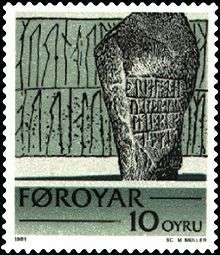Sandavágur stone
| Sandavágur stone | |
|---|---|
 | |
| Rundata ID | FR 2 M |
| Country | Faroe Islands |
| City/Village | Sandavágur |
| Produced | 13th century |
Text – Native | |
| Old Norse: Þorkell Ǫnundar sonr, austmaðr af Rogalandi, bygði þenna stað fyrst. | |
| Text – English | |
| Þorkell Ǫnundr's son, man of the east from Rogaland, lived in this place first. | |
| Other resources | |
|
Runestones – Runic alphabet Runology – Runestone styles | |
The Sandavágur stone (FR 2 M) is a runestone that was discovered in the town of Sandavágur on the Faroe Islands in 1917.[1] The stone can today be seen in the Sandavágur Church.
The inscription speaks of Þorkell, a man from Rogaland, Norway who claims to have lived on that place first. He is presumably one of the first settlers, if not the very first one, in the Sandavágur area. In both runes and language the Sandavágur stone corresponds to what is known from Rogaland around the 13th century.[2]
References
- ↑ According to the Sandavágur article.
- ↑ FR 2 - Sandavagur runesten
This article is issued from Wikipedia - version of the 9/13/2016. The text is available under the Creative Commons Attribution/Share Alike but additional terms may apply for the media files.